|
|
|
Sort Order |
|
|
|
Items / Page
|
|
|
|
|
|
|
| Srl | Item |
| 1 |
ID:
104154
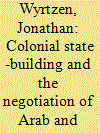

|
|
|
|
|
| Publication |
2011.
|
| Summary/Abstract |
Colonial state-building in Protectorate Morocco, particularly the total "pacification" of territory and infrastructural development carried out between 1907 and 1934, dramatically transformed the social and political context in which collective identity was imagined in Moroccan society. Prior scholarship has highlighted the struggle between colonial administrators and urban Arabophone nationalist elites over Arab and Berber ethnic classifications used by French officials to make Moroccan society legible in the wake of conquest. This study turns to the understudied question of how rural, tribal communities responded to state- and nation-building processes, drawing on a unique collection of Tamazight (Berber) poetry gathered in the Atlas Mountains to illuminate the multiple levels on which their sense of group identity was negotiated. While studies of identity in the interwar Arab world have concentrated on how Pan-Islamism, Pan-Arabism, and local nationalisms functioned in the Arab East, this article changes the angle of analysis, beginning instead at the margins of the Arab West to explore interactions between the consolidation of nation-sized political units and multivocal efforts to reframe the religious and ethnic parameters of communal solidarity during the colonial period.
|
|
|
|
|
|
|
|
|
|
|
|
|
|
|
|
| 2 |
ID:
141073
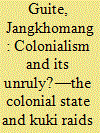

|
|
|
|
|
| Summary/Abstract |
This paper examines the colonial representation of tribal raids in the Northeast frontier of India and argues that, rather than being the ‘lawless and predatory habits of the savage hill tribes’, it was an expression of hill politics. The Kukis raided British territory when they discovered that an extension of the colonial boundary threatened their very existence as an independent state-evading population. It traces how the Kukis re-ethnicized themselves in the hills by evolving a system that is state-repellent, protected by a vast strip of forested jungle around their settlements commonly known as the ‘hunting ground’. It locates the ‘raid’ in the context of the difference in the perception of space and territoriality between the colonial state and indigenous polities. Colonial spatial ideology and its hill-valley binary are seen to play a vital role in animating tension on the frontier. The raid is thus understood as the ultimate weapon of resistance against an established state by an independent ‘not-a-state-subject’ people in defence of their autonomy and essentially represents non-state practices against state appropriations. Instead of being ‘unruly’, the raid is seen as a form of organized and premeditated resistance based on the consciousness of the hillmen's lived world order.
|
|
|
|
|
|
|
|
|
|
|
|
|
|
|
|
| 3 |
ID:
102752
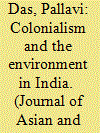

|
|
|
|
|
| Publication |
2011.
|
| Summary/Abstract |
Much of the deforestation seen in the Himalayas today can be traced back to the second half of the 19th century when railway construction began in colonial India. In this paper I argue that the construction and expansion of railways promoted by the British colonial state was designed to enable efficient resource extraction from India and that this process itself depleted India's natural resources such as forests. In analysing the temporal and spatial unevenness of this deforestation in the specific context of the Punjab province I have drawn on government records of various departments, Parliamentary reports, books, scientific journals and newspapers as primary sources.
|
|
|
|
|
|
|
|
|
|
|
|
|
|
|
|
| 4 |
ID:
080312
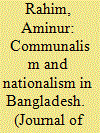

|
|
|
|
|
| Publication |
2007.
|
| Summary/Abstract |
The scholars of the South Asian politics have tended to take a one-dimensional view in national formations in Bangladesh, that is, identity formation is seen as either instrumental or primordial. Relying on the conceptual framework of social formation, this article argues that `Bengali' and `Muslim' are complementary. Group solidarity itself is seen as a social process that links to the everyday world that provides the space for the identity formation. It transcends the narrow utilitarian principle to strive for securing and organizing power itself
|
|
|
|
|
|
|
|
|
|
|
|
|
|
|
|
| 5 |
ID:
121948
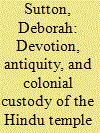

|
|
|
|
|
| Publication |
2013.
|
| Summary/Abstract |
In 1904, the British Indian government passed the Ancient Monuments Protection Act and, in doing so, radically enlarged the state's bureaucratic claim to structures defined, for the purposes of the Act, as monuments. The project of conserving the Hindu temple was beset by disagreements. The claims of the colonial state and local Hindu devotees were separated by different precepts about religiosity and alternate orders of aesthetics, time, and history. However, it is clear that there were also confluences: legislative authority could masquerade as custody of the antiquarian and, in practice, the secular veneration of material antiquity blurred with Hindu divinity. This paper combines an exploration of the principles of archaeological conservation, as they were formed in the European bourgeois imagination, and then traces their transfer, though imperial administration, to case-studies of specific temples. Of particular interest is the deployment of the Act by local administrations and the counter-challenges, appropriations, and manipulations of the same legislation. How were the aesthetic codes of conservation-and the legislation that sought to order and enforce their introduction-compromised by religious claims and practices?
|
|
|
|
|
|
|
|
|
|
|
|
|
|
|
|
| 6 |
ID:
130510
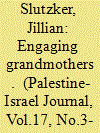

|
|
|
|
|
| Publication |
2011.
|
| Summary/Abstract |
In a small office in the West Bank town of Beit Jallah, just 10 minutes by car from Jerusalem, Tamara Rabinowitz and Siham Abu Awwad sit sipping thick Arabic coffee and finishing each other's sentences. To many in their communities they would seem a very unlikely pair of friends. Tamara, who immigrated to Israel from London in 1960, lost her son Ido in 1987 when he was serving in the Israel Defense Forces in Lebanon. Siham's brother Youssef was shot and killed by an IDF soldier at a checkpoint near their village. Her mother was a Palestinian political activist who served time in Israeli prison, along with three of Siham's brothers.
|
|
|
|
|
|
|
|
|
|
|
|
|
|
|
|
| 7 |
ID:
126661
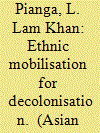

|
|
|
|
|
| Publication |
2013.
|
| Summary/Abstract |
This article attempts to communicate the methodological tension between subjectivity and objectivity by recording the aspiration of communities who are problematised both by colonialism and the modern nation-state. It highlights how colonial policy and practice contribute to the postcolonial imbroglio in Northeast India. It delineates how British colonial cartography always gave priority to 'administrative convenience' in the demarcation of boundaries, resulting in the division of ethnic community. It argues that Northeast India and the Indo-Burma borderland are not yet decolonised, as the government of India, without any rearrangement or alteration, adopts the colonial administrative boundaries, which divided ethnic communities. Neither the State Reorganisation Act (1956) nor the North-Eastern Areas (Reorganisation) Act (1971) fulfilled the aspiration of the segmented communities in the northeast, as they did in the mainland. The article also argues that the responses of the government of India towards the problems in Northeast India react to the manifested symptoms of the deep-rooted political problem rather than getting to the crux of the problem to find a solution.
|
|
|
|
|
|
|
|
|
|
|
|
|
|
|
|
| 8 |
ID:
131420
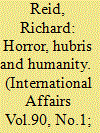

|
|
|
|
|
| Publication |
2014.
|
| Summary/Abstract |
This article examines the international engagement with Africa from the First World War and the apex of colonial rule through to the present day. It is argued that there have been dramatic shifts throughout this period-from increasing interventionism on the part of the colonial state, to decolonization and the emergence of nation-states with independent foreign policy programmes, to the predations and influences of the Cold War, to the developmentalism and humanitarianism of the contemporary era. Yet, there has also been marked continuity in terms of policy, perception and practice. In particular, Africa has long been seen in terms of economic opportunity-a place where markets and raw materials abound-and of military and political threat, a place in which intrinsic instability makes external intervention both desirable and inevitable. While immediate contexts have changed over time, the international engagement with the continent remains essentially economic and military. A concern for democratization and development represents a relatively new element, although even this can be traced to the paternalistic humanitarianism of the colonial era and, earlier still, moral stances toward Africa in the nineteenth century.
|
|
|
|
|
|
|
|
|
|
|
|
|
|
|
|
| 9 |
ID:
133467
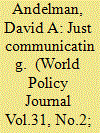

|
|
|
|
|
| Publication |
2014.
|
| Summary/Abstract |
-In March 1975, in what would turn out to be the final month of the war in Cambodia, I thought it might be a nice touch to place a call to my bride of six months and wish her a happy birthday. My interpreter/fixer/photographer, Dith Pranh, advised me to book the call a week or so in advance, which I did at the PTT (Post Telegraph)-the only locale where an international call had even a prayer of going through. At the appointed time, I appeared there and, after a wait of only several hours, the operator announced that my party was on the line in New York, and I could pick up "the apparatus" in Cabin #1. I lifted the phone and there, 7,000 miles away, was a very faint voice of Susan making its way through a cloud of electronic noise, crackles, and pops. We shouted at each other for a minute or so, before we finally gave up on any meaningful communication.
|
|
|
|
|
|
|
|
|
|
|
|
|
|
|
|
| 10 |
ID:
121955
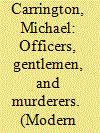

|
|
|
|
|
| Publication |
2013.
|
| Summary/Abstract |
As viceroy of India (1899-1905), George Curzon believed that unprovoked British assaults on Indians undermined the colonial state's authority to rule. These collisions1 challenged Curzon's conception of moral empire and called into question one of the most important representations of British moral character-that of 'officer and gentleman'. Aware of the strength of indigenous feeling in India and of liberal discontent at home, the viceroy engaged in what appears to have been a laudable defence of the rights of Indians. By doing so, he certainly risked the hostility of official and unofficial opinion in both Britain and India. The fundamental issue was: should the Raj be based on a ruling moral authority administered by men of character, in which collisions were reprehensible, or did it ultimately rest on force?
|
|
|
|
|
|
|
|
|
|
|
|
|
|
|
|
| 11 |
ID:
123124
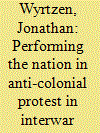

|
|
|
|
|
| Publication |
2013.
|
| Summary/Abstract |
This article applies a process approach to the study of nationalism, analysing anti-colonial protest in interwar Morocco to address how and why elite-constructed national identity resonates for larger audiences. Using Alexander's social performance model to study nationalist contention, it examines how a Muslim prayer ritual was re-purposed by Moroccan nationalists to galvanise mass protest against a French divide-and-rule colonial policy towards Moroccan Berbers that they believed threatened Morocco's ethno-religious national unity. By looking at how national identity was forged in the context of contentious performances and why certain religious (Islam) and ethnic (Arab) components were drawn on to define the Moroccan nation, this study offers a model for answering why national identity gets defined in specific ways and how the nation gains salience for broader publics as a category of collective identity.
|
|
|
|
|
|
|
|
|
|
|
|
|
|
|
|
| 12 |
ID:
130512
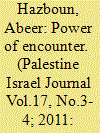

|
|
|
|
|
| Publication |
2011.
|
| Summary/Abstract |
We realized the need for "deeper understanding," allowing students the space and time to talk about culture, identity, their fears and the conflict itself.
How many of us have planned our lives to take a specific direction, only to find ourselves 10 years later in a totally different place? Seven years ago, a friend of mine introduced me to a group of people who were studying abroad and came to Jerusalem wanting to do something about the conflict. One of those people was a student at MIT who had taught computer science in an MIT program in Africa. He thought we might be able to do something similar for Israeli and Palestinian youths. As we all believed in education as a powerful tool to mobilize positive change, during the summer of 2004 we started the Middle East Education for Technology program, or MEET, based in Jerusalem.
|
|
|
|
|
|
|
|
|
|
|
|
|
|
|
|
| 13 |
ID:
132969
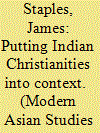

|
|
|
|
|
| Publication |
2014.
|
| Summary/Abstract |
Gandhian and Hindutva-inspired discourses around conversions to Christianity in India over-simplify the historical nexus of relations between missionaries, converts and the colonial state. Challenging the view that conversions were ever only about material gain, this paper draws on long-term ethnographic fieldwork with leprosy-affected people in South India to consider the role that conversion has also played in establishing alternative, often positively construed, identities for those who came to live in leprosy colonies from the mid twentieth century onwards. The paper draws out the distinctive values associated with a Christian identity in India, exploring local Christianities as sets of practices through which, for example, a positive sense of belonging might be established for those otherwise excluded, rather than being centred upon personal faith and theology per se. Biographical accounts are drawn upon to document and analyse some of the on-the-ground realities, and the different implications-depending on one's wider social positioning-of converting from Hinduism to Christianity in South India.
|
|
|
|
|
|
|
|
|
|
|
|
|
|
|
|
| 14 |
ID:
131913
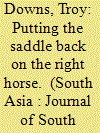

|
|
|
|
|
| Publication |
2014.
|
| Summary/Abstract |
Standard historical accounts of the Indian Revolt of 1857-58 give the impression that superiority on the battlefield accounted for the ability of the British to defeat their Indian adversaries. Yet, to focus solely on the military campaigns ignores the intricate and multifaceted nature of the British response to the Revolt. Aside from armed force, a number of counter-insurgency strategies were used to suppress rebellion in the countryside. This paper assesses the intent and effectiveness of these measures by looking at how officials responded to the outbreak of large-scale and protracted rural insurgency in the districts of the Benares Division. It is argued that these measures achieved a far greater degree of success in curtailing acts of rural insurgency than the use of military force.
|
|
|
|
|
|
|
|
|
|
|
|
|
|
|
|
| 15 |
ID:
131009
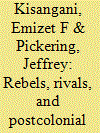

|
|
|
|
|
| Publication |
2014.
|
| Summary/Abstract |
A recent, notable strain of empirical research argues that postcolonial state-building follows a pattern similar to the European state-building experience. It acknowledges that war is less common today, but contends that interstate rivalry now drives state-building. We argue that postcolonial state-managers have little reason to build state capacity in response to rival states. There is only a slight chance that these rivalries will escalate into an existential threat for the government. Attention should instead be focused on the more tangible threat posed by transnational rebels and postcolonial governments' use of low-scale military force to combat such non-state actors. Using interrupted time series methodology on a sample of 72 countries from 1972 to 2002, we find that postcolonial state military intervention against transnational rebels increases direct taxes (a measure of state penetration) and non-tax revenue (state autonomy) collected by governments, while intervention against rival states reduces direct taxation.
|
|
|
|
|
|
|
|
|
|
|
|
|
|
|
|
| 16 |
ID:
128508
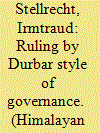

|
|
|
|
|
| Publication |
2013.
|
| Summary/Abstract |
In May 2009, in a small chat room in the Hunza Valley (in Northern Areas of Pakistan), a heated debate ?ared up over an old photograph. It showed Mir Muhammad Nazim Khan, ruler of Hunza State, from 1892
to 1938, and his Wazir, Humayun Beg, in ceremonial attire at the Imperial Coronation Durbar at Delhi in 1903. The opinions offered by the participants ranged from appreciation for great leaders of the past to their
utter condemnation as colonial 'devils' and exploiters. In fact, the photo conveys various messages. For me, first of all, it shows the integration of the Hunza Mir into a colonial hierarchy. Second, and more generally
speaking, it draws our attention to the world of durbars or 'ceremonial gatherings' in colonial India. Muhammad Nazim Khan was actively involved in this world.' He participated in two imperial durbars at Delhi, and every year he also attended a durbar, known as the Ialsa.
|
|
|
|
|
|
|
|
|
|
|
|
|
|
|
|
| 17 |
ID:
131563
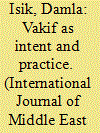

|
|
|
|
|
| Publication |
2014.
|
| Summary/Abstract |
Through ethnographic and archival research conducted in Istanbul and Izmir, this article examines the dynamics and regulation of charitable giving in contemporary Turkey. The article is based on interviews I conducted with the volunteers, employees, and aid recipients of three civil society organizations that rely on charitable giving to fund their projects, which center on helping the poor and providing aid during and after wars and other disasters. I document how religious ideals of anonymous charitable giving for the sake of giving, without expectation of return, are closely intertwined with anxiety over finding a worthy charitable association and recipient. In doing so, I focus on vak?f as both a concept and a practice that gives meaning to charitable giving in Turkey. The increasing desire to document, define, and categorize the deserving poor as a way to justify the intent to give and to receive goes against the anonymity and immediacy of giving, thus riddling intent with ethical contradictions. I argue that attention needs to be paid to the intent, practice, and various forms of giving, and not just to the effects and outcomes of charity.
|
|
|
|
|
|
|
|
|
|
|
|
|
|
|
|
| 18 |
ID:
085929
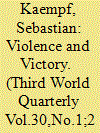

|
|
|
|
|
| Publication |
2009.
|
| Summary/Abstract |
This contribution critically investigates the ideas underpinning the armed struggle of colonial subjects against colonial states in the middle decades of the 20th century. It focuses in particular on two of the most influential texts that inspired and guided violent anti-colonial resistance, The Wretched of the Earth by Frantz Fanon and On Guerrilla Warfare by Mao Zedong. Both Fanon and Mao provided powerful analyses of the violent (psychological and military) underpinnings of colonialism and articulated strategies of resistance. This contribution argues that the persuasiveness of Mao's and Fanon's thought stemmed from their deep dialectical (ie Hegelian) understanding of war and colonialism. By demonstrating the dialectical foundations of Mao's and Fanon's thought-inspired intellectually by their readings of Carl von Clausewitz and Jean-Paul Sartre-the contribution illustrates how their understanding allowed them not only to fathom the interactive dynamics at the core of war and colonialism, but also to devise successful ways of unseating colonial power. Yet, while they shared a common belief in violent anti-colonial struggles, they nevertheless diverged fundamentally in their respective conceptions of violence. Mao (through Clausewitz) held an instrumental view of violence, whereas Fanon (through Sartre) understood violence in existential terms. This meant, as is argued here, that their respective conceptions of violence would not necessarily, on their own, have been sufficient to bring colonialism to an end. Taken together, however, their instrumental and intrinsic conceptions of violence complemented each other and helped armed anti-colonial struggles succeed around the globe.
|
|
|
|
|
|
|
|
|
|
|
|
|
|
|
|
| 19 |
ID:
143313
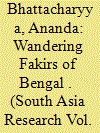

|
|
|
|
|
| Summary/Abstract |
The historiography of the Fakir rebellion has drawn much attention since Ghosh in 1930 depicted the Fakirs as raiders from outside Bengal. In independent India, two groups of ideology-driven historians, Marxists and Secularists, expounded the uprising as an early peasant rebellion and a shining example of Hindu–Muslim campaign against the Raj. This article explodes both scholarly myths, since its archival research reconfirms that the Fakirs were increasingly aggressive plunderers in religious garb, tormenting the Bengal countryside. Mainly based on colonial records, later parts of this article illustrate how and why the British felt increasingly compelled to curtail Fakir movements and activities.
|
|
|
|
|
|
|
|
|
|
|
|
|
|
|
|
| 20 |
ID:
131900
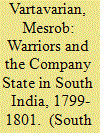

|
|
|
|
|
| Publication |
2014.
|
| Summary/Abstract |
After the collapse of the Mysore Sultanate in 1799, the British East India Company attempted to consolidate its authority in southern India by rolling back the prerogatives of warrior elites. This in turn generated revolts by disgruntled chieftains eager to retain their privileges. Conventional interpretations have viewed the relationship between independent warrior bands and the colonial state as mutually exclusive and irreconcilable. However a closer examination of the sources reveals that the emerging colonial state maintained control and pacified resistance by engaging in mutually beneficial alliances with loyalist warrior groups.
|
|
|
|
|
|
|
|
|
|
|
|
|
|
|
|
|
|
|
|
|